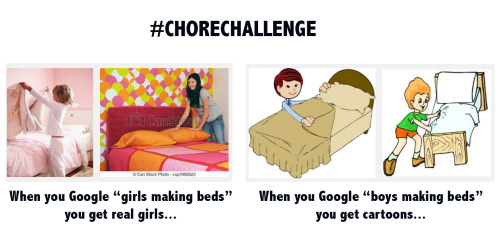sorayachemaly:Chances are, if you are like most people in the world, you live in a family where chor
sorayachemaly:Chances are, if you are like most people in the world, you live in a family where chores are done along gender lines and women and girls are spending an average of two hours more on chores per week. Many boys and men feel strongly, anecdotally, that this can’t be right. However, while men are doing more house and care work than prior generations, studies show that they reliably overestimate their domestic contributions, or undermine their ability to do them in a sustained way. On any given day, almost half of all women do some form of housework, compared to only one-fifth of men. If they are mothers, they spend nearly twice as long as fathers doing unpaid domestic work each week.Have you ever talked about what goes on in your own family? Who cooks? Who takes out the trash? What chores boys and girls do? Is it a sore point? We’d like to start a global conversation about why this is important. Today, together with Laura Bates, the founder of the Everyday Sexism Project, we are launching a global #ChoreChallenge:Keep a two-week log of activities and chores, including kids, in your family. Put everything on it and make sure to add activities that aren’t usually thought of as chores. For example, buying gifts, managing social calendars, doing taxes, making doctor appointments, school activities, car maintenance, or financial budgeting and planning.Analyze the list to see who does the bulk of what work.Gender-swap household responsibilities, all or just some, for as long as you can.If you have children, talk to them about work and stereotypes, gender roles and expectations.If you reach a milestone, or a hitch, or encounter some interesting differences, send your story or upload a photo to Breakthrough’s THE G WORD , using the #ChoreChallenge hashtag.Join the #ChoreChallenge tweetchat on Tuesday, January 12 at 9 a.m. EST/2 p.m. GMT/7:30 p.m. UTCThis is important and a tangible difference everyone can make. Family inequality is a driver of broader inequality that, in addition to being tied to larger economic imbalances, is a source of stress for families. In some homes kids doing chores is optional; in others, it’s absolutely necessary. In either case, they are a significant way that we are socializing children to understand gender as the basis not only for certain types of work, both physical and emotional, but also as the basis for valuing that work. Globally, the extra two hours of work girls do frees up time for boys to play, do sports or complete homework. Studies also show a gender gap in pocket money and allowance. Where children get chore-related allowances, boys are more likely to be paid and, when families have both boys and girls, to be paid more. In addition, the jobs that we learn girls and women are “naturally better” at, rarely a matter of discretion, are less visible and thought of as worth less. Boys easily learn through chores that they’re expected, as men, to always be strong, know how to fix things and perform, for financial gain, like workhorses, to the exclusion of nurturing their families or making important and healthy social connections.Read whole post here. -- source link
Tumblr Blog : sorayachemaly.tumblr.com
#sexism


